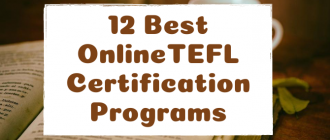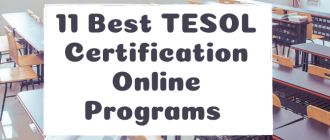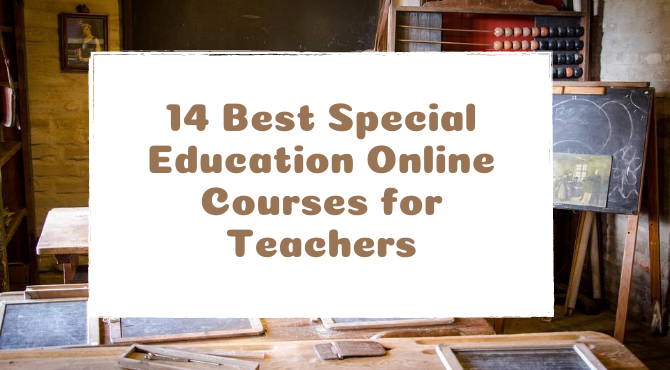
Special education addresses individual issues and disabilities that affect learning. Whether you are a general education teacher or a special education teacher, you will encounter students who have special needs.
And…
As a special education teacher, I am constantly searching for ways to increase my knowledge. I feel that the more professional training I obtain, the better I can serve my students.
The purpose of special education is to ensure that our students grow to their fullest potential by providing instruction designed to meet their unique needs. Students with disabilities or issues that affect their learning need to receive special attention and instruction.
I combed the internet in search of the best special education courses for teachers that are available online. These 13 online courses are among the top special education resources available on the web today!
Mental-Health Focused Examining Disabilities ADHD Types & Symptoms Skills Strengthening Language Development
Product
Details
1. SEL & SpEd (Coursera)

Check Current Price
2. Disability Inclusion In Education (Coursera)

Check Current Price
3. ADHD, Autism, Learning Disabilities, and Concussion (Coursera)

Check Current Price
4. Help and Hope for Dyslexics & Other Struggling Readers (Udemy)
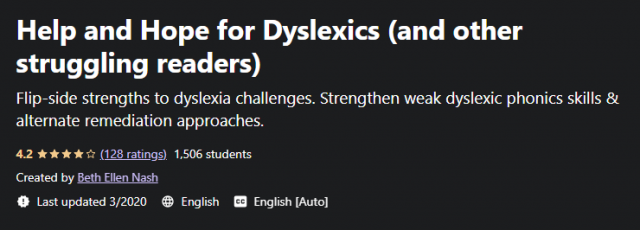
Check Current Price
5. Educational Psychology & SpEd (Udemy)
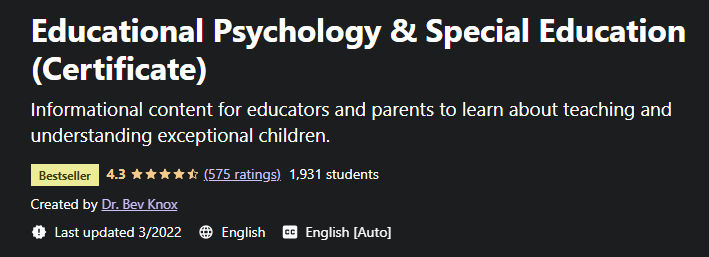
Check Current Price
Best Special Education Online Courses For Teachers
Online Special Education Courses
1. Providing Social, Emotional, Behavioral, and Special Education Services in School (Coursera)
2. Disability Inclusion in Education: Building Systems of Support (Coursera)
3. Managing ADHD, Autism, Learning Disabilities, and Concussion in School (Coursera)
4. Help and Hope for Dyslexics And Other Struggling Readers (Udemy)
5. Educational Psychology & Special Education (Udemy)
University Special Education Courses
6. Higher Education Teaching Certificate (Harvard)
7. Special Education – Discipline (Dominican University)
8. Master of Arts in Education/Special Education (University of Phoenix)
9. Using Technology to Foster Independence in the Special Education Student (Dominican University)
10. Special Education Teaching Methods (University of Phoenix)
11. Success for Everyone – UDL Readiness (Dominican University)
12. Master’s in Special Education (Saint Joseph’s University)
13. Positive Behavior Intervention and Support: RTI for Behavior (University of Maine)
Online Special Education Courses
Online classes are a convenient way to improve your skills and make your lessons better. With an online course, you can complete coursework and lectures around your teaching and personal schedule. Many online courses are also shorter and will require less of a time commitment on your part.
1. Providing Social, Emotional, Behavioral, and Special Education Services in School (Coursera)
Duration: 4 weeks
This course addresses how social-emotional skills, mental health, and learning are all related. It focuses on methods that schools use to support social-emotional learning, while at the same time, promoting good mental health for all students.
The course examines strategies that can be used to identify students who are at risk for developing problems and then highlighting interventions to help those with mental health issues. One feature I like about this class is that students are introduced to 2 actual students who make the instruction come alive.
You will learn:
- How schools think about mental health problems
- How at-risk students are identified
- What services are provided for students with disabilities
- How good mental health is promoted in schools
- How treatment differs in the school setting compared to a medical setting
User Feedback: “Beautifully in-depth discussions on a social, emotional and behavioral mental and physical health and how to assess and address it”
Best For: Teachers who are seeking ways to help at-risk students, school administrators seeking new solutions to mental health issues, and parents seeking to understand their child’s special needs.
2. Disability Inclusion in Education: Building Systems of Support (Coursera)
Duration: 4 weeks
This course examines in-depth the support teachers need in order to meet
the needs of children with severe physical and intellectual disabilities. The course includes discussions with a wide range of experts (from teachers to activists) about inclusive education. It does a good job of sharing their educational experiences.
You will learn:
- What disability inclusion means
- Examine disabilities as issues of social justice
- Identify educator support needs in relation to classroom inclusion
- Identify support structures that are available to teachers in schools
- Understand the specific support needs that are essential for learners with disabilities
User Feedback: “I’m truly satisfied that I followed this course. It enhanced my knowledge about Disability education and inclusion. Easy steps and instructions. Well informed. This will surely help me in my career.”
Best For: General education teachers seeking more information about inclusion, Special education teachers, and parents of children with physical or mental disabilities.
3. Managing ADHD, Autism, Learning Disabilities, and Concussion in School (Coursera)
Duration: 4 weeks
2nd in a series of 4 courses that lead to a certificate of specialization in School Health for Children and Adolescents.
This course focuses on common behavioral and developmental disorders that affect students and how schools support students. ADHD, learning disorders, and autism are all addressed. Additionally, the course describes the symptoms of concussions and how to manage them.
The course is well organized with real-life scenarios, interview modules, and discussions.
You will learn:
- Types of ADHD and their symptoms
- Autism Spectrum Disorder symptoms and management
- Common learning disorders and disabilities among children
- Concussions and their negative effect on children
- How these disabilities are diagnosed and managed
User Feedback: “A very concise and well thought of course, with oodles of information, precise terminologies. Should be on the to-do list for every educator in any field, as well as School administrators.”
Best For: Teachers, school administrators, and school health providers who care about students with different types of disabilities.
4. Help and Hope for Dyslexics And Other Struggling Readers (Udemy)
Duration: 4 weeks
This informative course for teachers addresses the question of why some children have reading and writing difficulties. Dyslexia is an issue that affects many of our students today.
This class equips its participants with new strategies that have proven to be useful in the struggle against dyslexia. New scientific findings are researched and discussed.
You will learn:
- Examples of reading and writing acquisition models
- What dyslexia is
- The negative effects of reading and writing difficulties
- Recent scientific evidence about literacy mastery
- New teaching strategies that support literacy
User Feedback: “A very comprehensive course that explained the fundamentals of dyslexia, learning, reading, and writing in youth. It built on itself week by week. Work load was fairly light and easy to review.”
Best For: Teachers looking for new reading and writing instructional strategies, parents wanting to understand dyslexia and searching for ways to help their children improve their reading and writing skills.
5. Educational Psychology & Special Education (Udemy)
Duration: 24 lectures • 4h 51m total length
This course is an overview of educational psychology and its many forms. Dr. Bev Knox, an award-winning professor for over 25 years, covers special education, learning types, teaching techniques, and other relevant topics.
The course is well planned with thought-provoking lectures.
You will learn:
- The definition of educational psychology
- The traits of exceptional children
- The effects of student diversity and achievement
- How students learn
- Language development and cognitive thinking
- Effective lessons
- An overview of eating disorders and personality disorders
User Feedback: “Thank you Dr. Knox. The course was really helpful. It has generated curiosity in knowing more about human mind. And it has also sparked my interest in diving deep into Psychology. Thank you once again :)”
Best For: Anyone with an interest in educational psychology, teachers, or parents with children who have special educational needs.
University Special Education Courses
Several Universities offer online special education courses. These courses are recognized and respected worldwide, leading to higher pay as well as greater financial stability. You can put your career on the fast track with one of these useful programs.
6. Higher Education Teaching Certificate (Harvard)
Duration: 8 weeks
This course is designed for those seeking to expand their teaching horizons into higher education. Its aim is to improve your teaching skills and introduce you to new teaching strategies that are relevant to higher education.
At the end of the class, you will be asked to reflect on what you have learned by writing your unique teaching philosophy and by creating a teaching portfolio that encompasses your experiences.
You will learn:
- Create a positive learning environment
- Create effective lesson plans
- Design or refine a syllabus
- Develop a teaching philosophy
- Construct a teaching portfolio
User Feedback: “You’ll walk away from the course at the very least with a higher-order understanding of teaching practices. You will walk away with a vocabulary around teaching, teaching practices, and how to begin or continue conversations around how to be a good teacher.”
Best For: Professors, lecturers, researchers, academic staff, or higher education instructors interested in improving their teaching skills.
7. Special Education – Discipline (Dominican University)
Duration: You are allowed 9 months to complete the course
This course addresses laws that are specific to students with disabilities. There are steps that must be taken when disciplining students with disabilities. The class provides valuable information that can help you avoid legal conflict.
You will learn:
- Basic understanding of special education law
- What steps must be taken when disciplining a child with special needs
- Develop checklists of behavior related to legal considerations when dealing with special needs children
- Identify and understand the requirements for disciplining a student with special needs
User Feedback: “My goal is to support teachers as they strive to become more culturally responsive in order to meet the diverse needs of their students.”
Best For: Special education teachers and school administrators who are interested in disciplining students with disabilities.
8. Master of Arts in Education/Special Education (University of Phoenix)
Duration: 21months*
*Individual student completion time may vary depending on calendaring and student teaching schedule.
You’ll need a total of 46 credits to complete this program. This is a degree program preparing candidates for initial teacher licensure. It is intended for students who have no prior teaching experience.
The program is for students who have already earned a bachelor’s degree and want to become special education teachers.
You will learn:
- Strategies for measuring students’ strengths and needs
- Laws pertaining to Special Education
- Identify disabilities including behavioral, physical, developmental, and the autism spectrum
- Positive classroom management strategies
- Inclusion strategies
- English emersion techniques
User Feedback: “I was able to have a second career as a high school English and Social Studies teacher for eleven years as a result of my Phoenix degree. It was a very happy and rewarding experience.”
Best For: Teachers who have already earned a bachelor’s degree and want to become special education teachers.
9. Using Technology to Foster Independence in the Special Education Student (Dominican University)
Duration: You are allowed 9 months to complete the course
This information-packed self-paced class offers technology-based strategies that help to increase independence in special education students. You will be given access to lots of free technology resources that can easily be implemented in your classroom.
You will learn:
- Differentiate your current lessons to make them more accessible for students who have learning disabilities
- Gain knowledge about specific learning disabilities like dyslexia, dysgraphia, and ADHD
- Implement accommodations for students who need them
- Use technology resources to engage students of all ability levels
- Understand and meet the needs of special needs students
User Feedback: “My experience at Dominican has overall been an amazing one.”
Best for: General education teachers or special education teachers who want to understand and meet the needs of special needs students.
10. Special Ed. Teaching Methods (University of Phoenix)
Duration: 4 weeks
An overview of teaching methods used in special education classrooms; this course focuses mainly on students with mild to moderate disabilities. Topics addressed include support systems, pedagogical practices, and the importance of collaborating.
The course also explores accommodations for exceptional learners, assistive technology, and critical skills acquisition.
You will learn:
- Discover strategies to incorporate students’ individualized education program (IEP) goals into lesson planning.
- Differentiate lesson plans to address the needs of exceptional learners
- Identify the difference between modifications and accommodations in lesson plans
- Investigate and implement assistive technology tools and resources into lessons
- Recognize the importance of collaborating with family members of students and other staff
User Feedback: “I have nothing but positives to say about the University of Phoenix. From the first day, I have always been treated as though I was physically there in class.”
Best For: Special education teachers who want to be aware of strategies to incorporate students’ individualized education programs.
11. Success for Everyone – UDL Readiness (Dominican University)
Duration: This online, self-paced course may be completed any time within nine months of registration
This course teaches participants how to utilize the principles of Universal Design for Learning (UDL) in classrooms. UDL is a flexible approach to customize learning in order to fit the needs of all students.
This course could be beneficial for both general education and special education instructors who are looking for ways to enhance student achievement and break down barriers.
You will learn:
- The major principles of Universal Design for Learning (UDL)
- Discover how UDL can be used in the classroom
- Identify the differences between UDL and traditional curriculum
- Understand the major principles of UDL and how they can be used successfully
- Develop a complete UDL unit plan
User Feedback: “My career has continued to flourish, and I believe that’s in large part due to the solid educational foundation Dominican provided me.”
Best For: General education teachers, special education teachers who want their lessons to fit the needs of all students.
12. Master’s in Special Education (Saint Joseph’s University)
Duration: 3 years
The curriculum for this program is designed for general education teachers who want to meet the requirements of students with special needs. Participants can choose a certification track or a concentration.
Students can also choose to receive multiple certifications with their master’s degree. This flexibility makes the program a desirable one for many.
You will learn:
- Foundations and current issues relevant to special education
- Technologies for differentiated instruction
- Cognitive processes
- Inclusive classroom practices
- Special education law and policy
User Feedback: “Excellent instructors and available classes. There are countless options and areas of study, and the support given is incredible.”
Best For: General education teachers who want to learn more about students with special needs.
13. Positive Behavior Intervention and Support: RTI for Behavior (University of Maine)
Duration: Varies
This certificate program delves into the subject of Response to Intervention B (RTI). RTI is a research-based method of prevention and intervention implemented to improve student behavior and academic performance. This multi-tiered system is explored in 3 core courses.
You will learn:
- Describe RTI methods and outcomes
- Implement a multi-tier RTI delivery system
- Understand reasons driving positive and negative behaviors
- Provide leadership and guidance to implement an RTI B Program
- Evaluate and sustain an RTI B Program
User Feedback: “I took a winter course online and it was excellent. The professors are very helpful and understanding. They are always available and reply to emails asap! I also was taking a spring course before the COVID-19 pandemic occurred and changed all courses online. Even with that happening, I still thrived in online courses and all professors were very understanding.”
Best For: Teachers, administrators, and community leaders seeking to implement a school-wide RTI B program.
This video offers a much more detailed explanation of what special education is about.
Closing Words
So, there you have it. The best online classes available to Special Education teachers. I think that the most effective teachers are those who are life-long learners and have a passion for their craft. They care about their students and are constantly searching for ways to help them live more productive lives, personally as well as academically. I hope that this list will be of value to those special teachers.
Here are some more links to explore to help you with classroom management and other useful information like 3D printing courses and laminating paper and cards.
Last Updated on May 13, 2022 by Emily
- Facebook9
- Twitter21
- Pinterest67
- 97shares













